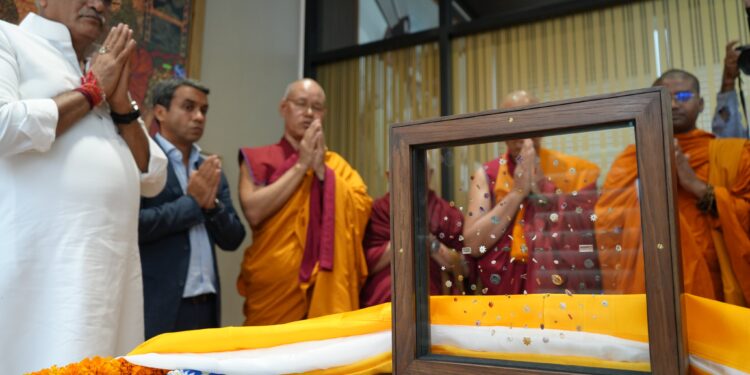India Celebrates Historic Return of Lord Buddha’s Piprahwa Relics After 127 Years
New Delhi, July 30, 2025 – In a landmark moment for India’s cultural and spiritual heritage, Prime Minister Narendra Modi announced the repatriation of the sacred Piprahwa relics of Lord Buddha, which have returned to India after 127 years. The relics, discovered in 1898 and taken abroad during the colonial era, were secured following the Indian government’s intervention to halt their auction at Sotheby’s in Hong Kong earlier this year.
The Piprahwa relics, unearthed by British landowner William Claxton Peppé at a stupa in Piprahwa, Uttar Pradesh, near the India-Nepal border, are believed to include bone fragments, ash, and gemstones associated with the historical Buddha. Excavated from a site identified as ancient Kapilavastu—where Prince Siddhartha, later known as Gautam Buddha, spent his early life—the relics are considered among the most significant archaeological finds in Buddhist history. An inscription in Brahmi script on one of the reliquaries, found alongside the artifacts, confirms their connection to the Shakya clan, to which the Buddha belonged.
Prime Minister Modi described the return as “a joyous day for our cultural heritage,” emphasizing that the relics “highlight India’s close association with Bhagwan Buddha and his noble teachings.” He further noted that their homecoming reflects India’s commitment to preserving its civilizational legacy, aligning with the government’s cultural vision of “Vikas Bhi, Virasat Bhi” (progress alongside heritage).
The relics, which include bone fragments, soapstone and crystal caskets, gold ornaments, and gemstones such as amethysts, corals, and pearls, were initially claimed by the British Crown under the 1878 Indian Treasure Trove Act. While a portion was sent to museums and Buddhist communities in countries like Sri Lanka, Myanmar, and Thailand, some remained with Peppé’s descendants, surfacing at the planned Sotheby’s auction in May 2025. The auction, estimated to fetch HK$100 million (approximately US$12.8 million), sparked global outrage among Buddhist scholars and leaders, who condemned the commodification of sacred artifacts.
India’s Ministry of Culture, in coordination with the Archaeological Survey of India and the Ministry of External Affairs, issued a legal notice to Sotheby’s and Peppé’s descendants, demanding the immediate cessation of the auction. The Indian government argued that the relics, classified as ‘AA’ antiquities under national law, are inalienable and their sale violates Indian and international regulations, including United Nations conventions. Sotheby’s postponed the auction on May 7, 2025, following India’s intervention, paving the way for negotiations that culminated in the relics’ return.
Union Culture Minister Gajendra Singh Shekhawat hailed the repatriation as a moment of pride, noting the relics’ “historical and spiritual significance” for Buddhists worldwide. He emphasized India’s ongoing efforts to work with international authorities to protect its cultural heritage.
The relics’ return has been met with widespread celebration. Rajya Sabha member Brij Lal, who urged swift government action in May, expressed gratitude to PM Modi for prioritizing the issue despite other national commitments. Public sentiment echoed this, with many describing the repatriation as a “historic and deeply emotional moment” that restores the “fragrance of Dharma” to India.
Scholars like Naman Ahuja, a professor of Indian art history at Jawaharlal Nehru University, underscored the relics’ importance as sharirik dhatu (bodily relics), considered the most sacred in Buddhist theology. According to Buddhist belief, these artifacts, including gemstones buried with the Buddha’s cremated remains, are revered as extensions of his physical presence, transforming over time into forms like quartz and amethyst.
The repatriated relics are set to be displayed at the National Museum in New Delhi, with plans to exhibit them at the Indian Museum in Kolkata, further strengthening India’s role as a custodian of Buddhist heritage. This development follows India’s recent “relic diplomacy,” with sacred relics previously sent to countries like Vietnam, Mongolia, and Sri Lanka, where they have drawn millions of devotees.
The return of the Piprahwa relics marks a triumph for India’s efforts to reclaim its cultural treasures lost to colonial plunder. It reinforces the nation’s spiritual ties to Lord Buddha and its commitment to preserving a legacy that resonates with Buddhists across Asia and beyond. As PM Modi noted, this milestone is a powerful symbol of India’s ancient heritage and its resolve to protect it for future generations.





































